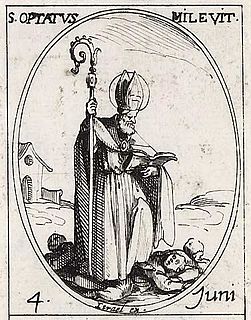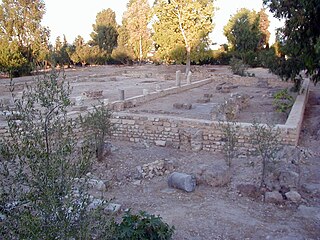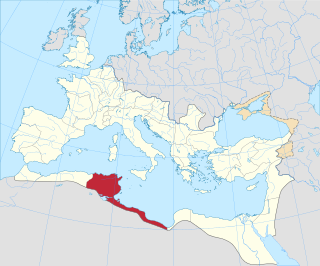Related Research Articles

Pope Miltiades, also known as Melchiades the African, was the bishop of Rome from 311 to his death on 10 or 11 January 314. It was during his pontificate that Emperor Constantine the Great issued the Edict of Milan (313), giving Christianity legal status within the Roman Empire. The pope also received the palace of Empress Fausta where the Lateran Palace, the papal seat and residence of the papal administration, would be built. At the Lateran Council, during the schism with the Church of Carthage, Miltiades condemned the rebaptism of apostatised bishops and priests, a teaching of Donatus Magnus.

Donatism was a Christian sect leading to a schism in the Church, in the region of the Church of Carthage, from the fourth to the sixth centuries. Donatists argued that Christian clergy must be faultless for their ministry to be effective and their prayers and sacraments to be valid. Donatism had its roots in the long-established Christian community of the Roman Africa province in the persecutions of Christians under Diocletian. Named after the Berber Christian bishop Donatus Magnus, Donatism flourished during the fourth and fifth centuries.
The Councils of Carthage were church synods held during the 3rd, 4th, and 5th centuries in the city of Carthage in Africa. The most important of these are described below.

Donatus Magnus, also known as Donatus of Casae Nigrae, became leader of a schismatic sect known as the Donatists in North Africa. He is believed to have died in exile around 355.

Saint Optatus, sometimes anglicized as St. Optate, was Bishop of Milevis, in Numidia, in the fourth century, remembered for his writings against Donatism.

The Archdiocese of Carthage, also known as the Church of Carthage, was a Latin Catholic diocese established in Carthage, Roman Empire, in the 2nd century. Agrippin was the first named bishop, around 230 AD. The temporal importance of the city of Carthage in the Roman Empire had previously been restored by Julius Caesar and Augustus. When Christianity became firmly established around the Roman province of Africa Proconsulare, Carthage became its natural ecclesiastical seat. Carthage subsequently exercised informal primacy as an archdiocese, being the most important center of Christianity in the whole of Roman Africa, corresponding to most of today's Mediterranean coast and inland of Northern Africa. As such, it enjoyed honorary title of patriarch as well as primate of Africa: Pope Leo I confirmed the primacy of the bishop of Carthage in 446: "Indeed, after the Roman Bishop, the leading Bishop and metropolitan for all Africa is the Bishop of Carthage."
Secundus of Tigisis was an early church leader and primate of Numidia. He was a leading organiser of the early Donatist movement in Carthage.

Avensa was a Roman and Byzantine-era civitas (city), in Roman North Africa.

Majorinus was the leader of a schismatic Christian sect in Roman North Africa known as the Donatists.
Felix, Bishop of Aptunga, in proconsular Africa was a 4th-century churchman, at the center of the Donatist controversy.
Maximian of Bagai was a 5th century bishop of Bagai in Roman North Africa. His life shows the extent that the religious schism in Roman North Africa could become violent.

Felicianus of Musti was a bishop of Musti in Numidia, Roman North Africa, involved in the Donatist controversy of the 4th century. He is known to history through the writings of Augustine of Hippo Regius.
Primian (Primianus) was an early Christian Bishop of Carthage, and leader of the Donatist movement in Roman North Africa. Seen as a moderate by some in his faction, he was a controversial figure in a time of fragmentation of the Donatists, a reactionary branch of Christianity.

Bagai was a Roman–Berber city in the province of Africa Proconsularis. It must have been of some reasonable size, as it was also the seat of an ancient Catholic bishopric. The ancient city has been identified with ruins at Ksar-Bagaï outside of Baghai, in the Aurès Mountains of the El Hamma District in Khenchela Province, Algeria.

Melzi was a civitas (town) of the Roman Empire during late antiquity. It was also known as Meditanus.

Migirpa was an ancient Roman-Berber civitas in the province of Africa Proconsularis. It flourished from 30 BCE to 640 CE. The town is identified as stone ruins near Carthage, Tunisia.
Asellicus of Tusuros was a 4th-century bishop of Tusuros, a Roman Town in what was Roman North Africa. He is known for being outspoken at the Council of Carthage of 411 and from a number of epistles with Augustine and Donatian of Reims.

The Diocese of Bennefa is a home suppressed and titular see of the Roman Catholic Church. Bennefa, identifiable with Oglet-Khefifa in modern Tunisia, is an ancient civitas of the Roman province of Byzacena. and a seat of an ancient Christian episcopal see. The diocese was mentioned by Augustine of Hippo.
Parmenian was a North African Donatist bishop, the successor of Donatus in the Donatist bishopric of Carthage. He wrote several works defending the rigorist views of the Donatists and is recognized as "the most famous Donatist writer of his day", but none of his writings have survived.
Cabarsussi, was an ancient civitas (municipality) and bishopric in the Roman province of Byzacena, that is tentatively identifiable with ruins at Drâa-Bellouan in modern Tunisia. The current bishop is Terence Robert Curtin, auxiliary bishop of Melbourne.
References
- 1 2 Maureen A. Tilley, The Bible in Christian North Africa: The Donatist World (Fortress Press) p133.
- 1 2 Chapman, John. "Donatists." The Catholic Encyclopedia Vol. 5. New York: Robert Appleton Company, 1909. 15 March 2021
 This article incorporates text from this source, which is in the public domain .
This article incorporates text from this source, which is in the public domain . - ↑ E. M. Atkins, Robert Dodaro, Augustine: Political Writings (Cambridge University Press, 2001) p241.
- ↑ Erika Hermanowicz, Possidius of Calama: A Study of the North African Episcopate in the Age of Augustine (Oxford University Press, 2008)p127-128.